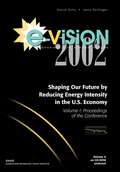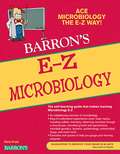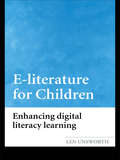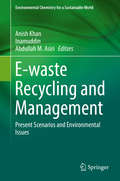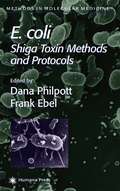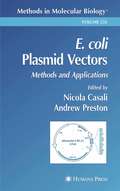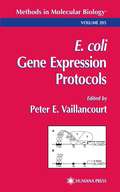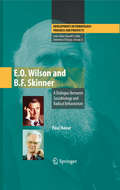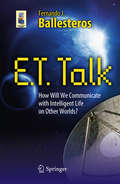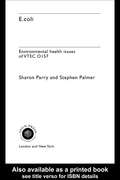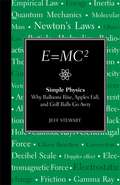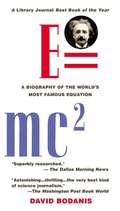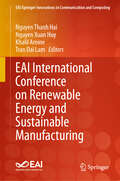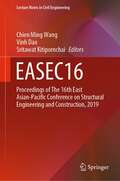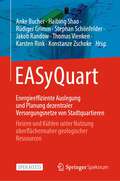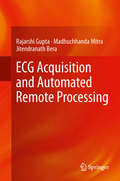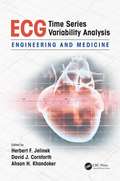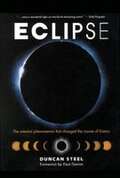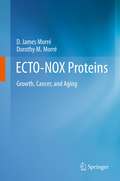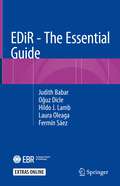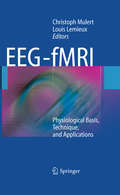- Table View
- List View
E-Vision 2002, Shaping Our Future by Reducing Energy Intensity in the U.S. Economy, Volume I
by David S. Ortiz Jerry M. SollingerThe E-Vision 2002 Conference, held in May 2002, was sponsored by the U.S. Department of Energy as a step toward implementing a key recommendation of the Bush administration's National Energy Policy. It gathered 150 of the nation's leading energy experts to discuss ways of reducing the country's energy intensity. This volume and the additional volume enclosed on CD-ROM contain the presentations and discussions that took place at the conference, including the identification of goals and the means to achieve them. It is a key work for those involved in implementing the National Energy Policy.
E-Z Microbiology (Barron's E-Z Series)
by Rene Krata<p>Microbiology makes sense when you approach it the E-Z way! Open this book for a clear, concise, step-by-step review of: <p> <li>The Microbial World <LI Cellular Metabolism and Genetics <li>Using a Microscope <li>Microbial Growth and Reproduction <li>Bacteria, Fungi, and Protozoa <li>Viruses and the Disease Process <li>Epidemiology. . . and more </li> <p> <p>Measure your progress as you learn Microbiology: <p> <li>Take time to review and understand each important concept <li>Take each chapter's quizzes and check your answers. And discover that learning Microbiology can be E-Z! </li>
E-literature for Children: Enhancing Digital Literacy Learning
by Len UnsworthAs ICT continues to grow as a key resource in the classroom, this book helps students and teachers to get the best out of e-literature, with practical ideas for work schemes for children at all levels. Len Unsworth draws together functional analyses of language and images and applies them to real-life classroom learning environments, developing pupils’ understanding of ‘text’. The main themes include: What kinds of literary narratives can be accessed electronically? How can language, pictures, sound and hypertext be analysed to highlight the story? How can digital technology enhance literary experiences through web-based 'book talk' and interaction with publishers' websites? How do computer games influence the reader/ player role in relation to how we understand stories?
E-waste Recycling and Management: Present Scenarios and Environmental Issues (Environmental Chemistry for a Sustainable World #33)
by Inamuddin Abdullah M. Asiri Anish KhanThis book gives up-to-date information and broad views on e-waste recycling and management using the latest techniques for industrialist and academicians. It describes the problems of e-waste generated by all global living communities and its impact on our ecosystems and discusses recycling techniques in detail to reduce its effect as well as proper management of e-waste to save the environment. It also considers future technological expectations from e-waste recycling and management technologies.
E. coli
by Frank Ebel Dana PhilpottA multidisciplinary panel of leading experimentalists details the key protocols for the diagnosis and study of the pathogenesis of Shiga toxin-producing Escherichia coli (STEC) and its isolated cytotoxin (Stx). Described in step-by-step detail, these readily reproducible techniques range from those for the diagnosis and detection of STEC bacteria in patient and animal samples, to those for studying the cellular microbiology of STEC infections, especially host-pathogen interactions and the hemolysin of STEC. There are also protocols for studying the details of Shiga toxin (Stx) biology-from the purification of the toxin to the effects of Stx on various host cell functions-and for exploring STEC-mediated disease in various animal models.
E. coli Plasmid Vectors
by Andrew Preston Nicola CasaliA comprehensive collection of readily reproducible techniques for the manipulation of recombinant plasmids using the bacterial host E. coli. The authors describe proven methods for cloning DNA into plasmid vectors, transforming plasmids into E. coli, and analyzing recombinant clones. They also include protocols for the construction and screening of libraries, as well as specific techniques for specialized cloning vehicles, such as cosmids, bacterial artificial chromosomes, l vectors, and phagemids. Common downstream applications such as mutagenesis of plasmids, recombinant protein expression, and the use of reporter genes, are also described.
E. coli Gene Expression Protocols
by Peter E. VaillancourtPeter E. Vaillancourt presents a collection of popular and emerging methodologies that take advantage of E. coli's ability to quickly and inexpensively express recombinant proteins. The authors focus on two areas of interest: the use of E. coli vectors and strains for production of pure, functional protein, and the use of E. coli as host for the functional screening of large collections of proteins and peptides. Among the cutting-edge techniques demonstrated are those for rapid high-level expression and purification of soluble and functional recombinant protein and those essential to functional genomics, proteomics, and protein engineering.
E.O. Wilson and B.F. Skinner
by Paul NaourReviewers have characterized Paul Naour's A Dialogue Between Sociobiology and Radical Behaviorism, which includes brief introductions by E.O. Wilson and B.F. Skinner's elder daughter, Julie Vargus, as an idea book. The work will undoubtedly have a significant academic market and provide students and scholars in biology, ethology, psychology, anthropology, sociology and economics a strong foundation in twentieth century history and systems. Praise for A Dialogue Between Sociobiology and Radical Behaviorism: - E.O. Wilson says of the book: ". . . excellent, an outstanding addition to the history of ideas. It will put Fred Skinner back in the pantheon and, providing context, serve as an excellent introduction to the content and central truths in radical behaviorism. Needless to say, I'm also grateful to have my work following Sociobiology given proper attention." -David Sloan Wilson, author of Darwin's Cathedral writes: "E.O. Wilson and B.F. Skinner agreed that the human capacity for change is both a product of genetic evolution and an evolutionary process in its own right. Yet, the paradigms of sociobiology and radical behaviorism went in very different directions. Paul Naour's insightful analysis of a taped conversation between Wilson and Skinner goes beyond the historical significance of the conversation and helps to integrate the two paradigms for the future." -Carl Haywood writes: "The present question is whether evolution by natural selection is a useful set of concepts for the development of psychology. Naour's proposed confluence of radical behaviorism and sociobiology suggests not only that it is, but also that radical behaviorism shares with sociobiology a debt and an allegiance to Darwinism."
E.T. Talk
by Fernando J. BallesterosWill it be possible to communicate with intelligent extraterrestrial life forms if we find them? How could we establish this communication, where would we begin? What does it mean to say that mathematics is a universal language? How could math be used to communicate with ETs? This book summarizes the work of SETI, the Search for Extraterrestrial Intelligence, and other search programs and considers the implications of, and concerns about, their possible success. Surely the next step after finding life elsewhere would be to try to communicate with it. The author of this book will suggest concrete ways to approach this problem. This book, published in Spanish first, tells us what scientists currently know about the origin of life and its possible presence in the rest of the universe. It also describes the various methods used today to search for life in the universe. But the major focus of the book is on communicating with ET and, using animals on Earth as an example, why we should feel encouraged that we will be able to do just that. The author even provides step by step instructions in a kind of language that could be used to converse with intelligent alien beings.
E.coli: Environmental Health Issues of VTEC 0157 (Clay's Library Of Health And The Environment Ser.)
by Stephen Palmer Sharon ParryThe control of E.coli 0157 is at the heart of the environmental health practitioner's professional agenda. This book is aimed at health professionals who need to be fully informed about the sources and effects of the organism in order to provide advice and enforce legislation at local level as well as providing non specialist professionals with a p
E3 Chemistry Review Book: High School Chemistry With New York State Regents Exams - The Physical Setting
by Effiong EyoChemistry students and Homeschoolers! Go beyond just passing. Enhance your understanding of chemistry and get higher marks on homework, quizzes, tests and the regents exam with E3 Chemistry Review Book. Formerly Surviving Chemistry Review Book, this is the newest edition of the book. With E3 Chemistry Review Book, students will get clean, clear, engaging, exciting, and easy-to-understand high school chemistry concepts with emphasis on New York State Regents Chemistry, the Physical Setting.. Easy to read format to help students easily remember key and must-know chemistry materials.. Several example problems with solutions to study and follow. . Several practice multiple choice and short answer questions at the end of each lesson to test understanding of the materials.. 12 topics of Regents question sets and 3 most recent Regents exams to practice and prep for any Regents Exam.This is the School Edition of our book. For teachers, this will make a great supplemental instructional resource that can be used from the beginning to the end of the school.The Home Edition of this book (ISBN: 978-1978362437) contains answer key to all questions in the book. Teachers who want to recommend our Review Book to their students should recommend the Home Edition. Students and parents whose school is not using the Review Book as instructional material, as well as Homeschoolers, should buy the Home edition. PLEASE NOTE: Although reading contents in both the school and home editions are identical, there is a slight difference in question numbers, choices and pages between the two editions. Students whose school is using the Review Book as instructional material SHOULD NOT buy the Home Edition.
E=MC2
by Jeff StewartYou don't have to be Einstein to understand quantum physics. With amusing examples from film, TV, and history, learn how physics affects everything in your surroundings--without the use of mind-bending math or the need for a particle accelerator. With E=MC2, you'll learn: When forces balance: Simple answers to questions such as, "Why do balloons rise while apples fall?" The Good, the Bad, and the Impossible: Why The Good, the Bad, and the Ugly is full of absurdities. (For someone whose characters often uphold the law, Clint Eastwood certainly defies the laws of physics in this film.) AC/DC: but only AC really rocks: Alternating current (AC) is much more complicated than direct current (DC). The voltage is constantly moving between positive and negative; the current therefore flows one way, and then the other (rocking back and forth). Why do I feel this warm glow?: The theory behind how the first stars were born General Relativity and GPS: The strange result of gravity on time is well proven. Compared to the interminable time you experience while stuck in a traffic jam, time literally runs faster (because gravity is weaker) in the orbiting GPS satellites that help your GPS system get its fix. At the speed of light: A refresher on the theory of relativity and an understanding of why--a hundred years later--Einstein's physics still points the way in cutting-edge research. Yu again: In the martial arts movie Crouching Tiger, Hidden Dragon, the rebellious young heroine, Jen Yu, blocks an attacker with her hand without standing or bracing herself. All the while, she holds a cup of tea in her other hand and doesn't spill a drop. Find out why kinetic energy and scalar quantity make her move impossible. It's physics for the rest of us. So why not come along for the ride? Advance at the speed of light through the fundamental laws of physics as they were discovered, proven wrong, and revolutionized. <
E=mc2: A Biography of the World's Most Famous Equation
by David BodanisAlready climbing the bestseller lists-and garnering rave reviews-this "little masterpiece" sheds brilliant light on the equation that changed the world. Bodanis begins by devoting chapters to each of the equation's letters and symbols, introducing the science and scientists forming the backdrop to Einstein's discovery-from Ole Roemer's revelation that the speed of light could be measured to Michael Faraday's pioneering work on energy fields. Having demystified the equation, Bodanis explains its science and brings it to life historically, making clear the astonishing array of discoveries and consequences it made possible. It would prove to be a beacon throughout the twentieth century, important to Ernest Rutherford, who discovered the structure of the atom, Enrico Fermi, who probed the nucleus, and Lise Meitner, who finally understood how atoms could be split wide open. And it has come to inform our daily lives, governing everything from the atomic bomb to a television's cathode-ray tube to the carbon dating of prehistoric paintings.
EAI International Conference on Renewable Energy and Sustainable Manufacturing (EAI/Springer Innovations in Communication and Computing)
by Nguyen Thanh Hai Nguyen Xuan Huy Khalil Amine Tran Dai LamThis book presents the proceedings of the EAI International Conference on Renewable Energy and Sustainable Manufacturing (ICRESM 2023), which took place in Ho Chi Minh City, Vietnam, December 16-17, 2023. The conference serves as a platform for researchers, practitioners, industry experts, policymakers, and stakeholders to share their latest findings, innovations, and best practices in the areas of sustainable practices and technologies that reduce reliance on non-renewable resources and encourage the impacts of smart industry 4.0. The papers address global challenges relating to the sustainable manufacturing, energy security and green technologies, and discuss applications that aid in lowering carbon emissions, preserving the environment, and fostering economic growth by supporting renewable energy and eco-friendly manufacturing. Together, the participants disseminate the latest technological advancements, processes, and strategies that promote renewable energy and sustainable manufacturing.
EASEC16: Proceedings of The 16th East Asian-Pacific Conference on Structural Engineering and Construction, 2019 (Lecture Notes in Civil Engineering #101)
by Chien Ming Wang Sritawat Kitipornchai Vinh DaoThis book presents articles from The 16th East Asian-Pacific Conference on Structural Engineering and Construction, 2019, held in Brisbane, Australia. It provides a forum for professional engineers, academics, researchers and contractors to present recent research and developments in structural engineering and construction.
EASyQuart - Energieeffiziente Auslegung und Planung dezentraler Versorgungsnetze von Stadtquartieren: Heizen und Kühlen unter Nutzung oberflächennaher geologischer Ressourcen
by Karsten Rink Haibing Shao Rüdiger Grimm Anke Bucher Stephan Schönfelder Jakob Randow Thomas Vienken Konstanze ZschokeDas Open-Access-Buch bietet ein Entscheidungshilfesystem für die Beheizung/Kühlung von Stadtteilen durch oberflächennahe geothermische Ressourcen.Die Energieversorgung von Stadtquartieren spielt eine Schlüsselrolle bei der Erreichung der Klimaschutzziele. In diesem Zusammenhang bietet der geologische Raum ein grundlastfähiges Wärmepotenzial für die städtische Wärmeenergieversorgung. Der optimierte Betrieb von Wärmepumpensystemen ist entscheidend für einen niedrigen Primärenergieverbrauch sowie eine effiziente und nachhaltige Nutzung der geothermischen Ressourcen. Die derzeitige Auslegungspraxis für geothermische Großanlagen basiert im Wesentlichen auf den gleichen Bedingungen, die für Einzelanlagen geschaffen wurden. Gefragt sind jedoch Quartierslösungen, die eine optimierte Anlagendimensionierung ermöglichen. EASyQuart entwickelt ein standortbezogenes Entscheidungshilfesystem für die Beheizung/Kühlung von Stadtquartieren unter Nutzung oberflächennaher geothermischer Ressourcen. Die Projektergebnisse umfassen Arbeitsabläufe, Bewertungskriterien und wissenschaftliche Instrumente, die helfen sollen, eine wirtschaftlich ungünstige Systemdimensionierung zu vermeiden. Auf Basis der Ergebnisse sollen Auslegungsverfahren und regulatorische Rahmenbedingungen flexibilisiert werden.
ECG Acquisition and Automated Remote Processing
by Rajarshi Gupta Madhuchhanda Mitra Jitendranath BeraThe book is focused on the area of remote processing of ECG in the context of telecardiology, an emerging area in the field of Biomedical Engineering Application. Considering the poor infrastructure and inadequate numbers of physicians in rural healthcare clinics in India and other developing nations, telemedicine services assume special importance. Telecardiology, a specialized area of telemedicine, is taken up in this book considering the importance of cardiac diseases, which is prevalent in the population under discussion. The main focus of this book is to discuss different aspects of ECG acquisition, its remote transmission and computerized ECG signal analysis for feature extraction. It also discusses ECG compression and application of standalone embedded systems, to develop a cost effective solution of a telecardiology system.
ECG Time Series Variability Analysis: Engineering and Medicine
by Herbert F. Jelinek David J. Cornforth Ahsan H. KhandokerDivided roughly into two sections, this book provides a brief history of the development of ECG along with heart rate variability (HRV) algorithms and the engineering innovations over the last decade in this area. It reviews clinical research, presents an overview of the clinical field, and the importance of heart rate variability in diagnosis. The book then discusses the use of particular ECG and HRV algorithms in the context of clinical applications.
ECLIPSE: The celestial phenomenon that changed the course of history
by Duncan SteelWhether interpreted as an auspicious omen or a sentinel of doom, eclipses have had a profound effect upon our cultural development. Throughout recorded history, they have evoked consternation, fear, and dread—as well as awe and wonderment.Ancient peoples were clearly disconcerted by them. The Romans marked pivotal battles with the Greeks by references to an eclipse. The date of the crucifixion of Jesus Christ has been derived by using biblical mentions of an eclipse. Perhaps most famously, Christopher Columbus extorted much-needed foodstuffs from some increasingly unfriendly native hosts by purporting to demonstrate the wrath of his most powerful God when he accurately predicted a lunar eclipse.The pattern that eclipses follow—a cycle, called the saros—was actually calculated thousands of years ago. However, it is only with the help of modern computers that we have been able to analyze and appreciate the data. Eclipses provide unique opportunities for today’s scientists to study such contrasting phenomena as the upper layers of the sun, the slowdown of our planet’s spin rate, and the effects of celestial events on human psychology.In Eclipse, Duncan Steel expertly captures our continuing fascination with all manner of eclipses—including the familiar solar and lunar varieties and other kinds involving stars, planets, asteroids, and comets as well as distant galaxies and quasars. Steel helps us see that, in astronomical terms, eclipses are really rather straightforward affairs. Moving beyond the mysticism and the magic, the science of eclipses is revealed.
ECO 219 Samagralakshyi Arthashastra S.Y.B.A - Y.C.M.O.U
by Shri. C. P. Kher Prof. Sau. Anita Gogate Prof. Dr. Sau. Vidya Sohoni Umesh RajaderkarSamagralakshyi Arthashastra ECO 219 textbook for S.Y.B.A. from Yashwantrao Chavan Maharashtra Mukta Vidyapith, Nashik in Marathi.
ECTO-NOX Proteins
by D. James Morré Dorothy M. MorréThis volume documents this unique family of cell surface proteins. Despite masquerading as intractable and difficult to clone and characterize, ENOX proteins have and continue to offer remarkable opportunities for research, commercial development and outside confirmation of therapeutic, diagnostic and new paradigms to help explain complex biological processes.
EDC Earth Science
by Ruth KrumhanslOur home planet is an incredible and largely unexplored place. Less is known about Earth's surface than about the surface of the Moon, or Mars. As you work your way through the chapters of this course, you'll learn things that are well understood by scientists and you'll also encounter uncertainties. You'll be challenged to support your answers with evidence, and encouraged to debate them with your classmates. At the end of this course, you should feel like you've learned many things.
EDiR - The Essential Guide
by Judith Babar Oğuz Dicle Hildo J. Lamb Laura Oleaga Fermín SáezThis EDiR guide has a practical rather than a theoretical focus, and is intended as a reference tool for potential EDiR candidates who would like to gain a better understanding of the EDiR examination. A pool of experts has made every possible effort to create a single source that contains everything needed to successfully pass the EDiR examination. Times have changed, and there is certainly a new generation of radiologists who will find this cutting-edge tool a “must-have” to familiarize themselves with the examination quickly and easily. The book is divided into the following main sections: one chapter for each subspecialty; one chapter on Safety, Management and Imaging Procedures; another on Principles of Imaging Techniques and Processing; and lastly, one on Management. This structure follows the same pattern as the EDiR examination, which is based on the European Training Curriculum (ETC) for Radiology released by the European Society of Radiology (ESR). Each subspecialty is covered using the same basic structure: Multiple Response Questions (MRQs), Short Cases (SCs) and CORE Cases from one of the most recent EDiR examinations. Students will thus be able to see all the questions from a recent examination and learn from the answers and comments provided by our pool of experts. Clinical cases as electronic supplementary material complete the book, and links to EDiR preparation sessions are also included, allowing students to improve their knowledge of specific areas.
EEG - fMRI
by Louis Lemieux Christoph MulertFunctional magnetic resonance imaging (fMRI) and Electronecephalography (EEG) are very important and complementary modalities since fMRI offers high spatial resolution and EEG is a direct measurement of neuronal activity with high temporal resolution. Interest in the integration of both types of data is growing rapidly as it promises to provide important new insights into human brain activity as it has already done so in the field of epilepsy. The availability of good quality instrumentation capable of providing interference-free data in both modalities means that electrophysiological and haemodynamic characteristics of individual brain events can be captured for the first time. Consequently, it seems certain that the integration of fMRI and EEG will play an increasing role in neuroscience and of the clinical study of brain disorders such as epilepsy. The proposed book will discuss in detail the physiological principles, practical aspects of measurement, artefact reduction and analysis and also applications of the integration of fMRI and EEG. All applications, which are mainly in the fields of sleep research, cognitive neuroscience and clinical use in neurology and psychiatry will be reviewed.
